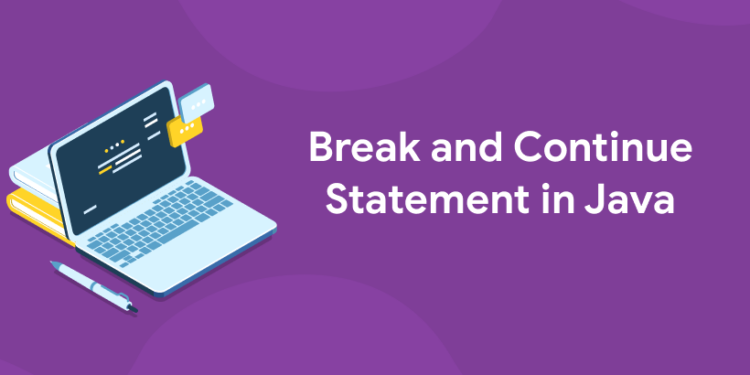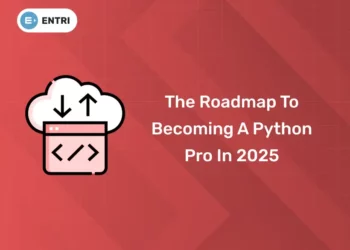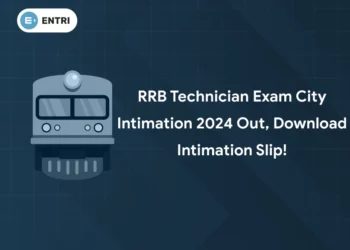Table of Contents
The break statement can be used to terminate the execution of the body of a loop statement, or used with a label in a switch statement, and the continue statement can be used to send control from the top of the body of a loop back to the condition test. These statements are equivalent to the related structured control flow statements in C and are used in similar circumstances. Java includes two statements that control the flow of the program execution. These statements are often referred to as flow control statements and are generally only used within loops. The break in java transfers program execution to the end of the loop while continuing to transfer program execution to the beginning of the next iteration of the loop. In this article, we will discuss each statement in more detail and give some examples of their use in Java programs.
What is the Break Statement?
1: What is the default value of a boolean in Java?
The break statement is used to break out of a loop. It can be used to exit a for, while, or do-while loop. The break in java can also be used to break out of a switch statement. When the break statement is executed, the program will immediately exit the current loop or switch statement. The java continue statement may also be used to skip the rest of the current iteration of a loop. If the continue statement is executed within a nested loop, it will only skip execution of the innermost (inner) most nested (inner) loop that it’s contained within. For example: if there are two loops in which one loops 5 times and another loop 10 times, when you execute a continue statement from inside an innermost nested 10-loop with 5 iterations left, it would skip executing 5 more iterations of that innermost nested 10-loop and jump straight to executing 5 more iterations on that outermost (outer) most nested (inner) 5-loop with 9 iterations left. This continues until it reaches a level where there are no more iterations left. If the continue statement is executed outside of any nested loops, then it would skip executing just this iteration and continue on to the next iteration as normal.
To know more about java programming in the Entri app
What is the Continue Statement?
The continue statement is used to resume the next iteration of a loop. In other words, when a continue statement is encountered inside a loop, control jumps to the beginning of the next iteration of the loop. The continue statement can be used with any type of loop such as for loop, while loop, or do-while loop. Let’s take an example of the for a loop. Let’s say we have this code:
for (int i = 0; i <= 100; i++) { if (i == 10) { continue; } System.out.println(Value + i); } In this case, 10 will not be printed out on the screen because it’s being skipped over by the continue statement. For example, imagine you wanted to print numbers 1 through 5. You could use a while loop and break out at 5. Here’s what that would look like:
Get the latest updates on java programming in the Entri app
int counter = 1; while (counter <= 5) { System.out.println(Number + counter); counter++; } With the break in java, on the other hand, there are two ways to execute it. One way is when you want to stop executing a loop from within the same method that contains it. When using this approach, there should be no argument passed into the method which contains the loop. If there is an argument passed into a method containing a loop then the execution of that method will terminate and return back up to where it was called from rather than exiting from just that one function call altogether so as long as there are some statements left after returning then they’ll still execute so make sure your program doesn’t rely on executing just after continuing.
Enroll in our latest java programming course in the Entri app
How to use Break and Continue Statement in Java
The break statement is used to exit a loop prematurely, while the continue statement is used to skip over an iteration of a loop. In this blog post, we’ll take a look at how to use both statements in Java. First, let’s take a look at the break statement. The break statement can be used in both for and while loops. When the break statement is encountered, the loop will immediately exit. For example, let’s say we have a for loop that iterates through an array of integers. If we encounter a 0, we want to exit the loop immediately. We can do this with the following code int nums = {2, 3, 4};
for (int i=0; i<nums.length; i++) {
if (nums == 0) { break;} } } // end of for loop In contrast, the continue statement can only be used in while loops. Similar to the break statement, when a continue statement is encountered, control passes over to the next iteration of the loop without completing it. However, unlike break which terminates execution of the entire loop right away, continue makes execution jump back up to the top of its enclosing loop without going past any intervening statements. It simply skips executing any remaining instructions in its body other than re-executing itself again on its next pass through its own body.
Get free placement assistance in the Entri app
Putting It All Together
The break statement is used to exit a loop early, while the java continue statement is used to skip over an iteration of a loop. In this blog post, we’ll show you how to use both statements in Java. We’ll also provide some examples of when you might want to use each type of statement. To demonstrate the usage of these two statements, let’s create a simple program that calculates a person’s age from their birth date
1) create an integer called year and initialize it to the current year minus 1900 (ex: 2017)
2) create an integer called days which will hold the number of days since 1/1/1900
3) Create a for loop that calculates how old someone is by multiplying year with 365 and adding 1 day for every day from 1/1/1900 up until today.
4) After calculating their age on line 5, add 10 years so they don’t die too quickly! 5) Display their new age on the screen
6) Set day equal to 0 at the start of the next loop
7) Add 1 to a year every time through the loop
8) Exit when the year equals 2020
Get the latest updates on java programming in the Entri app
Example Program
In this program, we’ll use the break and java continue statements to print only even numbers from a list of integers. First, we’ll create a list of integers called nums. Then, we’ll use a for loop to iterate through the list. If the current number is odd, we’ll use the continue statement to skip it. Otherwise, we’ll print the number and then use the break in java to exit the loop. Finally, if there are no more items left in the list, we’ll output an appropriate message. Let’s run the program and see what happens! Here’s our program:
public class ExampleProgram {
public static void main(String args) { int nums; for (int i=0; i<nums.length; i++) {
if (i%2 == 0) { System.out.println( + i); } else{ System.out.println(Odd); }
if (i == 5){ break; } }
System.out.println(No more items.); }
This program simply iterates through a list of integers, skipping even numbers using break and continue statements, then exits once it’s reached all of them! Here are some other things you can try.
Enroll in our latest java programming course in the Entri app
Summary
The break statement terminates the loop immediately and transfers execution to the statement following the loop. The continue statement causes the loop to immediately skip to the next iteration of the loop. In a for loop, continue causes execution to skip to the update statement. In a while or do-while loop, execution skip to the Boolean expression. For other loops, like for-each loops and nested loops, there is no effect on the termination condition. A continue statement with no label is compiled as a break that terminates the innermost enclosing loop (labeled or not). When you use a labeled continue statement to terminate the outermost loop, it does not affect any enclosing loops. But when an unlabeled continue statement appears anywhere within a loop block, it terminates only the innermost enclosing loop that has the same label. Labeled continue statements may be used at any point within a loop block. Unlabeled continue statements may appear anywhere within a loop block. Unlabeled continue statements are most often used after tests involving the index variable in a for loop. It is important to note that the compiler will always generate code to test this before executing the code inside the continued loop. If we want to use an unrolled iterator instead of using nested loops, we can switch from using a while or do-while statement.
Get the latest updates on java programming in the Entri app
Difference between Break and Continue Statement
The break statement exits the current loop, while the continue statement starts the next iteration of the loop. The break statement can be used with any type of loop, while continue can only be used with loops that have a condition, such as a for a loop. If you use a break statement inside a for loop, the code will exit the loop and continue on to the next line of code after the loop. If you use a continue statement inside a for loop, the code will skip over the rest of the code in the current iteration of the loop and continue on to the next iteration. If you want your program to take different actions depending on whether or not an event occurred, then it is sometimes necessary to set up an if-elseif-else block: public void doStuff(String event) {
if (event == complete) { System.out.println(Complete!); } else if (event == start) { System.out.println(Started!); } else if (event == error) { System.out.println(Error!); } else { System.out.println(Unknown); // Fallback action }
Exercises
The break statement is used to exit a loop early, while the continue statement is used to skip over a single iteration of a loop. In this exercise, we’ll use both statements to print out only even numbers from a list. First, we’ll create a variable that stores each number in the list: int num = 0; Then we’ll initialize it with the first number in the list: num = 0; We can then declare our for loop using our variable: for (int i=0; i<5; i++) { Now you can use either break or continue as you see fit: if (i%2 == 0) {continue;} else {break;} You should have now printed out only the even numbers from your list! The full code listing is shown below public class ExerciseBreakAndContinue { public static void main(String args) { int num = 0; for (int i=0; i<5; i++) { if (i%2 == 0) {continue;} else {break;} } System.out.println(Exercise Break And Continue Statement in Java); } }
There are many other cases where you might want to include a break or continue statement in your loops. Here are some other examples that show how to apply them effectively: Check If an Element Is There – Let’s say we have an array and we need to check if there’s an element present at one of its indexes. To do so, you can use a conditional like so: array[index] != null && !array[index].equals() && …; Using any condition after those two checks means there was no value at that index, which is exactly what we want when looking for values within arrays.
Conclusion
The break statement immediately terminates the loop statement in which it appears. The continue statement skips the remainder of the current iteration of the loop and continues execution at the top of the loop. These statements can be used to alter the normal flow of a program. When used within nested loops, the break statement will only terminate the innermost loop. The continue statement behaves similarly, only skipping the innermost loop iteration. It is important to know how these statements work in order to properly utilize them within your programs. If you have an outer loop that may need to iterate more than once, but an inner loop that needs to stop after just one iteration, you can use a combination of break and continue statements to accomplish this.
If there are no more iterations for the outer loop after executing the inner loop’s code block with a break statement, then the next time through the outer loop there will be no additional iterations. On the other hand, if there are still iterations left for the outer loop when executing its code block with a continue statement, then there will be another iteration in which code from inside that block is executed before going back up one level to execute code outside of it again. If you are interested to learn new coding skills, the Entri app will help you to acquire them very easily. Entri app is following a structural study plan so that the students can learn very easily. If you don’t have a coding background, it won’t be a problem. You can download the Entri app from the google play store and enroll in your favorite course.
Enroll in our latest java programming course in the Entri app











